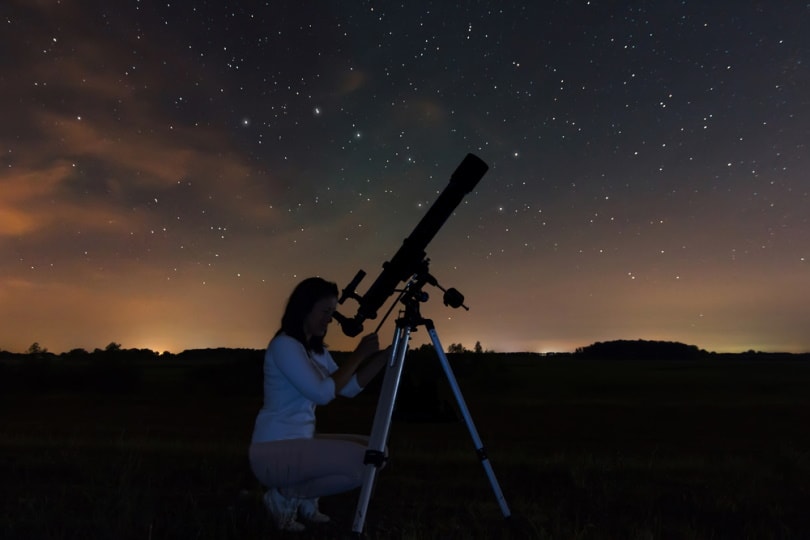What Are Stars Made Of? The Interesting Answer
Last Updated on

Stars are made of hot hydrogen and helium, but they also include carbon, iron, nitrogen, and oxygen. Most of the materials used in a star were used by past stars and recycled for the new star. In the future, the star will run out of fuel and eject its materials so it can be reused for another star.
There is a lot more to know about what stars are made of, though. Read on for a complete look at the composition of a star.

The Composition of a Star
It’s best to think of a star as an exploding ball of gas. The main components within the star are hydrogen and helium. The hydrogen and helium act as the star’s fuel. For most stars, about 90% of the fuel is hydrogen and 10% is helium. Whenever a star burns, it uses up this fuel and undergoes a constant nuclear reaction.
It might be helpful to think of the sun in this case. The sun contains a high amount of hydrogen. This hydrogen is constantly having a nuclear reaction, similar to the hydrogen bomb. Because of how much hydrogen is in the sun, it will take billions of years for all the fuel to be used up.
Although hydrogen and helium are the most common substances within stars, there are other elements as well. Stars normally contain small amounts of heavy elements, including carbon, iron, nitrogen, and oxygen. These elements are typically found in small quantities and represent just 0.1% of the star’s composition.
These heavier elements are almost always created by pre-existing stars. You might not know this but stars go through a life cycle. Whenever the star dies or runs out of fuel, the heavier material is ejected back into space. In other words, these heavy elements are recycled from star to star. Once the present star runs out of fuel, the elements will be recycled again.

How Do We Know What Stars Are Made Of?
Scientists have not been able to visit a star or a sun directly. Because constant nuclear reactions are occurring in the star, these objects are incredibly hot. The sun’s surface, for example, is 10,000 Fahrenheit degrees, and that temperature increases the further into the sun you go. Needless to say, it’s dangerous and impossible to actually test a star or sun directly.
Given that fact, how do scientists know what stars are made of? Scientists typically predict the composition of stars and planets using something called spectroscopy. Spectroscopy essentially looks at the spectrum light spread to determine composition.
All elements have a unique light spectrum, almost like a fingerprint. Using special instruments, scientists can look at the wavelengths of stars and predict what elements are within them. Given that stars are nearly 100% helium and hydrogen, it’s easy for scientists to see these two elements in the stars.
Looking for the other trace elements is a little bit difficult. The more elements that are present, the more difficult the job becomes because the appearance is altered. Even so, scientists can use spectroscopy to predict what substances are found within stars.


Conclusion
Next time you look at the night sky, you know you’re looking at exploding balls of fury. Stars are mainly made up of helium and hydrogen sources, but there are other heavy elements that have been recycled from star to star. Even the sun is made-up of these materials.
Featured Image Credit: Piqsels
About the Author Robert Sparks
Robert’s obsession with all things optical started early in life, when his optician father would bring home prototypes for Robert to play with. Nowadays, Robert is dedicated to helping others find the right optics for their needs. His hobbies include astronomy, astrophysics, and model building. Originally from Newark, NJ, he resides in Santa Fe, New Mexico, where the nighttime skies are filled with glittering stars.
Related Articles:
What Is the Best Binocular Magnification for Hunting? Optical Features Explained
Can You Use Binoculars to Look At Stars? How to Choose the Right Pair
How to Clean a Refractor Telescope: Step-by-Step Guide
How to Clean a Telescope Eyepiece: Step-by-Step Guide
How to Clean a Rifle Scope: 8 Expert Tips
Monocular vs Telescope: Differences Explained (With Pictures)
What Is a Monocular Used For? 8 Common Functions
How to Clean a Telescope Mirror: 8 Expert Tips
